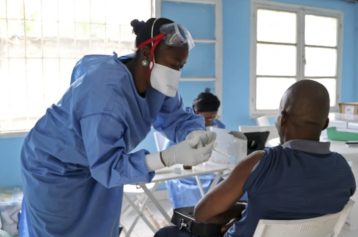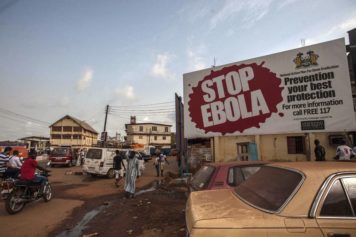A deadly wave of the Ebola virus has taken the lives of 14 people in Uganda this month, according to Ugandan health officials, who identified the virus Saturday after weeks of speculation. The announcement was made alongside a World Health Organization representative during a new conference in Kampala, confirming that there is “an outbreak of Ebola” in the region.
A decade ago, Ebola was perhaps the most feared virus in the world because of its speed and deadliness. The average case-fatality rate is an estimated 68 percent. But its speed has also kept it from spreading more rapidly—because sick patients usually are hit so quickly with the devastating illness and usually limit their travel.
“Laboratory investigations done at the Uganda Virus Research Institute…have confirmed that the strange disease reported in Kibaale is indeed Ebola hemorrhagic fever,” the joint statement from the Ugandan government and WHO read.
Kibaale has been the source of several reports of a mysterious disease in recent weeks, with citizens of the Midwestern district unable to determine the source. Initial inquiries by Ugandan health officials were unable to confirm the illness after weeks of laboratory tests. Joaquim Saweka, the WHO representative in Uganda, told Associated Press reporters on Friday that investigators were “not so sure” that the outbreak was Ebola, and a Ugandan official went as far as dismissing it as a possibility. Evidence of the disease seems to have appeared overnight.
The 14 deaths make up some of the 20 reported cases in Uganda. Two of the infected citizens have been quarantined for examination and treatment by health officials. The Ebola virus claimed the life of a clinical officer, as well as her 4-month-old baby, health officials reported. A national emergency taskforce has been mobilized to prevent the spread of the disease.
Ebola has no cure or vaccine. In 2000, the virus claimed the lives of 224 people in Uganda, and left hundreds more in fear of a plague. Though the disease has surfaced in the years in between, no outbreak has been comparable to the one in 2000. Ebola is highly infectious and presents itself as a hemorrhagic fever, with symptoms including muscle aches, vomiting, diarrhea and even internal and external bleeding. The virus was first identified in Congo in 1976, and was named after the river where it was recognized.
With the virus verified as Ebola, officials said they can now work to control the disease. “Being a strange disease, we were shocked to learn that it was Ebola,” district health secretary Stephen Byaruhanga said. “Our only hope is that in the past when Ebola broke out in other parts of Uganda it was controlled.”


